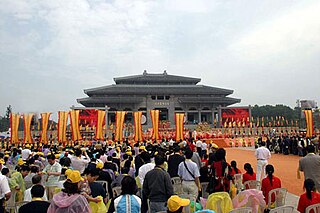
Laozi, also rendered as Lao Tzu and Lao-Tze, was an ancient Chinese philosopher and writer. He is the reputed author of the Tao Te Ching, the founder of philosophical Taoism, and a deity in religious Taoism and traditional Chinese religions.

James Legge was a Scottish sinologist, missionary, and scholar, best known as an early and prolific translator of Classical Chinese texts into English. Legge served as a representative of the London Missionary Society in Malacca and Hong Kong (1840–1873) and was the first Professor of Chinese at Oxford University (1876–1897). In association with Max Müller he prepared the monumental Sacred Books of the East series, published in 50 volumes between 1879 and 1891. His respect for Confucianism was controversial among his fellow missionaries.

The Tao of Pooh is a book written by Benjamin Hoff. The book is intended as an introduction to the Eastern belief system of Taoism for Westerners. It allegorically employs the fictional characters of A. A. Milne's Winnie-the-Pooh stories to explain the basic principles of philosophical Taoism. Hoff later wrote The Te of Piglet, a companion book.

The Te of Piglet is a 1992 philosophical non-fiction book written by Benjamin Hoff as a companion to his 1982 work The Tao of Pooh. The book was published by Dutton Books and spent 21 weeks on the Publishers Weekly Bestseller List and 37 weeks on the New York Times Bestseller List.

Wu wei (无为) is a concept literally meaning "without exertion." Wu wei emerged in the Spring and Autumn period, and Confucianism, to become an important concept in Chinese statecraft and Taoism, and was most commonly used to refer to an ideal form of government including the behavior of the emperor. Describing a state of unconflicting personal harmony, free-flowing spontaneity and savoir faire, it generally also more properly denotes a state of spirit or mind, and in Confucianism accords with conventional morality. Sinologist Jean François Billeter describes it as a "state of perfect knowledge of the reality of the situation, perfect efficaciousness and the realization of a perfect economy of energy", which in practice Edward Slingerland qualifies as a "set of ("transformed") dispositions ... conforming with the normative order."
The Three Treasures or Three Jewels are basic virtues in Taoism. Although the Tao Te Ching originally used sanbao to mean "compassion", "frugality", and "humility", the term was later used to translate the Three Jewels in Chinese Buddhism, and to mean the Three Treasures in Traditional Chinese Medicine.
Chinese Taoist Association, founded in April 1957, is the main association of Taoism in the People's Republic of China. It is recognized as one of the main religious associations in the People's Republic of China, and is overseen by the State Administration for Religious Affairs. Dozens of regional and local Taoist associations are included in this overarching group, which is encouraged by the government to be a bridge between Chinese Taoists and the government, to encourage a patriotic merger between Taoism and government initiatives. The group also disseminates information on traditional Taoist topics, including forums and conferences. The association was a major sponsor of the 2007 International Forum on the Tao Te Ching. The Chinese Taoist Association advocates the recompensation of losses inflicted on Taoism by the Cultural Revolution. Taoism was banned for several years in the People's Republic of China during that period.
The importance of music in Taoist ceremony is demonstrated by revealing how central beliefs are reflected through elements of music such as pandas, instrumentation and rhythm. The ritual celebrating the birth of Guanyin was observed at the Evergreen Taoist Church of Australia, Deagon to identify structure, role of participants, music forms and instrumentation. Expression of spiritual beliefs through music enables followers of Taoism to enhance their path to enlightenment.
Wang Bi (226–249), courtesy name Fusi, was a Chinese neo-Daoist philosopher.

The Vinegar Tasters, is a traditional subject in Chinese religious painting. The allegorical composition depicts the three founders of China's major religious and philosophical traditions: Confucianism, Buddhism, and Taoism. The theme in the painting has been interpreted as favoring Taoism and critical of the others.
The Huahujing is a Taoist book. The work is traditionally attributed to Laozi.

In the study of comparative religion, the East Asian religions form a subset of the Eastern religions. This group includes Chinese religion overall, which further includes Ancestral Worship, Chinese folk religion, Confucianism, Taoism and so-called popular salvationist organisations, as well as elements drawn from Mahayana Buddhism that form the core of Chinese Buddhism and East Asian Buddhism at large. The group also includes Japanese Shintoism and Korean Sindoism, which have received influences from Chinese religions throughout the centuries. Chinese salvationist religions have influenced the rise of Korean and Japanese new religions—for instance, respectively, Jeungsanism, and Tenriism; these movements draw upon indigenous traditions but are heavily influenced by Chinese philosophy and theology.

Alex Anatole is a Taoist priest, teacher, and writer. He directs centers of Taoist studies in Russia and the United States.
The history of Taoism stretches throughout Chinese history. Originating in prehistoric China, it has exerted a powerful influence over Chinese culture throughout the ages. Taoism evolved in response to changing times, with its doctrine and associated practices being revised and refined. The acceptance of Taoism by the ruling class has waxed and waned, alternately enjoying periods of favor and rejection. Most recently, Taoism has emerged from a period of suppression and is undergoing a revival in China.
Frederic Henry Balfour was a British expatriate editor, essayist, author, and sinologist, living in Shanghai during the Victorian era. He is most notable for his translation of the Tao Te Ching. Many of these translations appeared in his 1884 Taoist Texts: Ethical, Political and Speculative, also known simply as Taoist Texts.
The following outline is provided as an overview of and topical guide to Taoism:

Taoist philosophy also known as Taology refers to the various philosophical currents of Taoism, a tradition of Chinese origin which emphasizes living in harmony with the Tao. The Tao is a mysterious and deep principle that is the source, pattern and substance of the entire universe.












